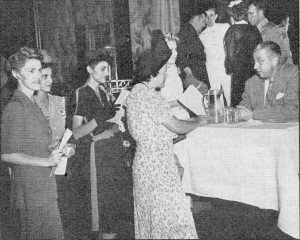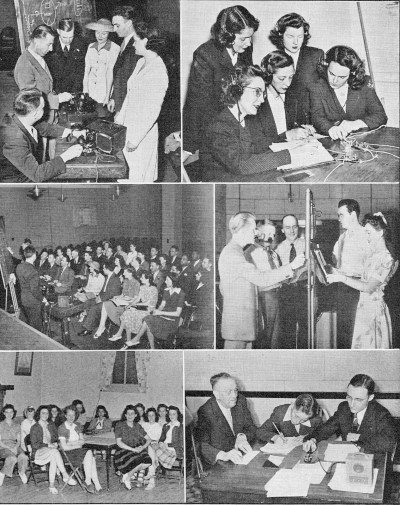September 1942 QST
 Table
of Contents Table
of Contents
Wax nostalgic about and learn from the history of early electronics. See articles
from
QST, published December 1915 - present (visit ARRL
for info). All copyrights hereby acknowledged.
|
There was a time when a sense of national
pride accompanied an ingrained a desire to perform a civic duty, particularly when
crisis or war was upon the country. Unlike today's environment of "rights" and entitlements
promised by politicians without any authority in the Constitution, people volunteered
to assist neighbors and friends for the good of not just their immediate neighborhoods,
but of their country. Rationing was imposed on many goods by the government for
the sake of the war effort, but most folks were more than willing to comply since
nearly everyone had a son, father, uncle, or good buddy serving to defeat the Axis
powers. Recall the scene in "It's a Wonderful Life," where George Bailey and family
served as volunteers for the Red Cross, bottle and tire drives, and Civil Defense
block wardens, while younger brother Harry flew bombers.
As is their proud history, Ham radio operators contributed mightily to the war
effort by helping to train civilians in the proper and efficient operation of radio
equipment, and by joining the service to apply their own skills to the task. Here
is an article that appeared in the November 1942 edition of QST magazine on the
subject of training.
Training Civilians for Wartime Operating
Organizing Community Classes for Radio Training
By John Huntoon W1LVQ
In the prosecution of the war our armed forces find themselves confronted with
a great shortage of trained specialists. This is particularly true in the communications
field. Training schools by the hundreds with a prodigious total enrollment have
been set up to relieve this shortage, but they are not enough. Then, too, the flow
of trained civilians into military service has stripped essential home communications
activity of personnel, creating a serious problem in finding operators to man the
War Emergency Radio Service.
Many affiliated clubs and other amateur groups have responded to this need by
setting up classes in radiotelegraph code and theory in their re-spective communities.
Now that Autumn is upon us and the school season returns, this is an "all-out" call
to every club and every amateur remaining home to assist in this widespread training
work. Let it not fall on deaf ears at "one of those meetings of hams-at which everyone
sits and suggests that something ought to be done," (as Jack Hill describes them
on page 80). This is an important job, one which we amateurs can do well since we
have a supply of the necessary raw material - instructors and equipment.
 The new War Emergency Radio
Service needs many trained operators. Sixty-nine YL's graduated June 28th from A
WVS radio classes under the supervision of Leonore Conn. W2NAZ, and are now awaiting
their amateur licenses from FCC. Reeve Strock, W2GTZ. deputy radio aide for New
York City, was right on hand to sign up the gals for participation in WERS.
Our broad objectives should be three-fold:
First, to give pre-induction training to prospective selectees so that they may
advance rapidly during their military communications schooling; second, to prepare
local civilians to fill essential communications jobs whose former holders have
gone to war; and third, to train operators for the War Emergency Radio Service.
Every training class should have as its goal the acquisition of an FCC license,
amateur or commercial, by each student; such a license is about the only documentary
evidence, aside from a radio engineering degree, which military personnel officers
will honor in support of a candidate's claim to radio ability.
Planning
The first step is to decide what scope of train-ing you will offer - code or
theory, and to what degree. Important considerations will be what instructor material
is available and what equipment can be secured. Probably code is the better course
to offer, at least at the beginning, for it is a more interesting one to evening
students and one which a greater percentage of amateurs are capable of teaching.
It is obvious that only reasonably-good operators - meaning good fists rather than
high speed - should be allowed to handle the code classes, so that no poor sending
habits will be transmitted to students; we want to turn out a product far superior
to some of the mass-production non-amateur Army field operators we often hear.
You will need a classroom, of course. The principals of local schools should
be willing to help you out; in fact, they may wish to offer the course as part of
their regular evening-school training. If this source is not productive, contact
civic clubs, the YMCA, chambers of commerce - we're certain you won't need to go
further. (You need not be particular, but if there is a choice between classrooms
choose one which has the most sound insulation.)
If your town has a population greater than 50, you need have no fear of the success
of your course. If publicity should appear in a local paper you probably will need
a police guard to handle the crowds around the registration point you name! Of course,
a large number of applications is a desirable thing; you can reserve the right to
select students on your own specification, and can thereupon proceed to choose first
those for whom induction is imminent, and so on.
Training Aids
 Above are pictured some examples
of amateur-sponsored community training classes in radiotelegraph code and theory,
designed to give both stay-at-home civilians and future Army selectees preliminary
knowledge of radio-communication.
Upper and center left: The Bamberger classes are held in the
WaR studios, with Ed Oberle, W2LCA, instructing in theory. Lower left: Troop of
Rock Springs, Wyoming, Girl Scouts receiving code instruction from John Duffy, W7DIE.
Upper right: First graduates of the Navy League Service radio class, instructed
by Walter Faries, who will be remembered as the winner of the Cairo Survey Award.
Center right: The St. Paul Radio Club's 15-minute radio program goes on KSTP. to
teach code to Twin Cities' listeners; left to right, Leo Hartig; J. L. Hill, W9ZWW;
A. E. Swanberg, W9BHY; R. N. Runyon; Dorothy Swanberg. Lower right: Dr. E. F. Murphy,
age 68, and Glenn Still, 12, learn code from Willard Coder, W9HWS, president of
the St. Paul Club. Has your club started a training program yet?
Adequate training literature in the form of student texts for both code and theory
classes is available from Hq, In addition, we shall be glad to send to any club
without charge a mimeographed set of material containing hints to code instructors,
together with some practice material. There is also available, gratis, an outline
of a theory course based on the Handbook, though the current QST series is much
more elaborate and detailed.
Equipment is not much of a problem in code classes, for an adequate oscillator
may be built from nearly every amateur junk box. Procurement of new headphones and
keys is not always possible, but students can be informed that they must bring their
own 'phones, along with the suggestion they scout around, inquiring of friends and
acquaintances for old pairs; they exist in many attics and cellars and usually will
fill the need. Telegraph keys can be acquired in the same manner, while early receiving
practice is under way; keys may be shared, too, so that a supply equal to the class
enrollment is not necessary. As a last resort only, if sufficient 'phones are not
available, buzzer sets or a loud speaker may be used. The equipment problem becomes
more complicated for classes on theory, but here again the junk box may be source
number one, for the QST-course series utilizes demonstration units constructed to
a great extent from just that type of gear.
General
In any class, but particularly in one aiming at the radiotelephone third-class
operator permit, you should plan to turn out operators, not just licensees. If you
happen to be instructing members of the Civil Air Patrol, for example, make certain
they get classroom practice simulating airport control station and aircraft contacts,
so they will learn voice technique in a snappy manner. Give your code students practice
operating in networks, alternating the control station assignment, and let them
handle dummy messages. Trainees should receive guidance in copying to typewriter,
ten-to-the-line. In theory classes, allow as much time for "laboratory" work as
possible; nothing is more abstract than radio technique when only a paper knowledge
exists.
To any affiliated club wishing to conduct code tests, ARRL will be glad to send
a supply of proficiency certificates upon receipt of an application accompanied
by a description of how the competition will be conducted, equipment used, etc.
The awards are issued in the name of the sponsoring group, and can be used for sending
or receiving ability.
By no means least, keep us informed of your activities. Let us know how many
persons you are training and to what end, so we may list you in the "Honor Roll."
We want amateur radio to do a bang-up job in community radio training, and we want
to chronicle it in QST's pages.
Posted April 5, 2019
(updated from original post on 3/21/2011)
|











